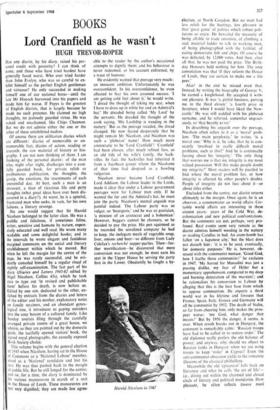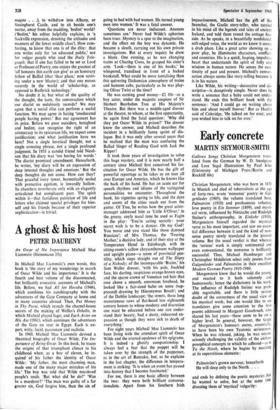Lord Cranfield as he wasn't BOOKS
HUGH TREVOR-ROPER
Has any diarist, by his diary, raised his per- sonal credit with posterity? I can think of none; and those who have tried hardest have generally fared worst. Who ever tried harder than John Evelyn, who was so careful to ex- hibit himself as the perfect English gentleman and virtuoso? He only succeeded in making himself one of our national bores—until the late Mr Hiscock burrowed into his papers and made him far worse. If Pepys is the greatest of English diarists, that is largely because he made no such pretence. He claimed no high thoughts, no jealously guarded virtue. He was naked and unashamed, like Chips Channon. But we do not admire either the one or the other of these uninhibited nudists.
Of course there are utilitarian diaries which arc different: diaries of memorable or un- memorable fact, diaries of action, reading or research, the raw material of history or bio- graphy. I am not now thinking of them. I am thinking of the personal diarist: of the man who, night after night, discharges into a care- fully guarded book, for private relish or posthumous publication, the thoughts, the gossip, the emotions, the resentments of each uneventful day. At best, such a man is an introvert, a man of vicarious life and petty thoughts (what great ideas have ever been dis- covered in a diary?). At worst, he is a spiteful, frustrated man who seeks, in vain, for his own failures, a literary revenge.
No one would suggest that Sir Harold Nicolson belonged to the latter class. He was a prolific and felicitous, if sometimes feline, writer, sensitive and humane by nature, expen- sively educated and well read. He wrote many readable and some delightful books; and in the intervals he wrote elegant and fastidious marginal comments on the social and literary establishment within which he moved. But when he left the margin for the centre of the page, he was rarely successful, and he evi- dently consoled himself by a regular ritual of nightly self-examination. The last part of his diary (Diaries and Letters 1945-62 edited by Nigel Nicolson, Collins 45s), which he took care to type out 'in revised and publishable form' before his death, is now before us. Edited by one son, dedicated to the other, en- riched by extracts from the diaries and letters of the editor and his mother, explanatory notes on family retainers, and an abundant genea- logical tree, it introduces us gaping outsiders into the cosy bosom of a cultured family. Like Sunday tourists filing through the carefully arranged private rooms of a great house, we admire, as they are pointed out by the domestic guide, the tactfully opened visitors' book, the signed royal photographs, the casually exposed Book Society choice.
This volume begins with the general election of 1945 when Nicolson, having sat in the House of Commons as a 'National Labour' member, stood as a 'National' candidate and lost his seat. He was thus pushed back to the margin of public life. But he still longed for the centre; and so, for a time, the diary is dominated by his various manoeuvres in search of a seat in the House of Lords. These manoeuvres are not very dignified; they are made less agree-
able to the reader by the author's occasional attempts to dignify them; and his behaviour is never redeemed, or his account enlivened, by a trace of humour.
He evidently wanted that peerage very much: an innocent ambition. Unfortunately he was overconfident. In his overconfidence, he even affected to fear his own assumed success. 'I am getting cold feet about it,' he would write. 'I dread the thought of taking my seat, when I have to dress up in white fur and an Admiral's hat.' He dreaded being called 'My Lord' by the servants. He dreaded the thought of the cook saying, 'His Lordship is weeding in the nuttery.' But as the peerage receded, the dread changed. He now feared desperately that he might remain Mr Nicolson, and Nicolson was such a 'plebeian' name! How much more aristocratic to be 'Lord Cranfield'! 'Cranfield' had been chosen, after much refined fuss, as an old title of his wife's family, the Sack- villes. In fact, the Sackvilles had inherited it from a Jacobean grocer whom the Nicolsons of that time had despised as a howling vulgarian.
Nicolson never became Lord Cranfield. Lord Addison, the Labour leader in the Lords, made it clear that under a Labour government peerages were for Labour men only. If he wanted the fur and the Admiral's hat, he must join the party. Nicolson's mental anguish was painful indeed. The Labour party was so vulgar, so 'bourgeois,' and he was so patrician, 'a mixture of an aristocrat and a bohemian.' However, beggars cannot be choosers, so he decided to pay the price. His pen squirmed as he recorded the unrefined company he had to keep, the inelegant meals of vegetable soup, liver, onions and beer—so different from Lady Colefax's recherché supper-parties. Then—fur- ther mortification—he discovered that mere conversion was not enough; he must earn his seat in the Upper House by serving the party first in the Lower. Obediently he fought a by- Harold Nicolson in 1967 election, at North Croydon. But no man had less relish for the hustings, less pleasure in that 'great game' of politics which robust poli- ticians so enjoy. He bewailed the necessity of being affable to trade unionists, of climbing a real, material ladder to talk to working men, of being photographed with the faithful, of eating democratic fish and chips. Of course he was defeated, by 12,000 votes. And then, after all that, he was not paid the price. The Birth- day Honours held nothing for him. The only consolation was that 'if they reform the House of Lords, they are certain to make me a life peer.'
Alas! in the end he missed even that. Instead, by writing the biography of George V, he earned a knighthood. He accepted it with- out pleasure. It was 'a pitiful business, putting me in the third eleven,' a fourth prize in Scripture, when I would have liked the New- castle.' He was still saddled with his plebeian surname, and he referred, somewhat ungraci- ously, to 'that beastly KCVO.'
In describing his anguish over the peerage, Nicolson often refers to it as a 'moral' prob- lem. 'The main perplexity,' he writes, 'is a moral one.' Why is it, he asks, that he is con- stantly 'involved in really difficult moral problems, such as this?' And he is continually fussing about his 'integrity.' The only thing that worries me is that my integrity is my most valued possession. Will this make people doubt my integrity?' Most readers will be puzzled to find where the moral problem lies, or how integrity is affected by other people's doubts. People of integrity do not fuss about it—or about titles either.
Excluded from the centre, our diarist returns ultimately to the margin. Once again, he is an observer, a commentator on world affairs. Cer- tainly world affairs are interesting in these sixteen years: years of the Cold War, de- colonisation and new political confrontations. But the comments are not, perhaps, very pro- found. Real events seem very remote as the diarist admires himself weeding in the nuttery or reading Catullus in bed. An atom-bomb has fallen 'on a Japanese city,' but the blast does not disturb him: 'it is to be used, eventually, for domestic purposes.' He is, however, ob- sessed with the communist menace. 'Good God, how I loathe those communists!' he exclaims in 1947. 'My hatred for Mussolini was just a passing dislike, my fear of Hitler but a momentary apprehension, compared to my deep and burning detestation of the marxists'; and he rationalises his conversion to Labour by alleging that this is the best base from which to oppose communism. He expects a third world war in his lifetime and foresees that France, Spain, Italy, Greece and Germany will all be communist by 1952. The death of Stalin; so far from cheering him, only makes the pros- pect worse: 'my God, what danger that means!' But by 1956 the danger, it seems, is over. When revolt breaks out in Hungary, the comment is remarkably calm: 'Russian troops have had to be called in to restore order.' The old diplomat really prefers the old balance of power; and ar.yway, why should we object to Russian tanks in Hungary when we are using troops to keep 'order' in Cyprus? Even the anti-communist obsession yields to the romantic illusions of the classical philhellene.
Meanwhile the old 'epicurean' falls back on literature and what he calls 'the art of life'- i.e., dining out within the charmed and closed circle of literary and political mandarins. How pleasant, he often reflects (suave marl magno . . .), to withdraw into Albany, or Sissinghurst Castle, and to sit beside one's nectar, away from the madding, 'bedint' world! ('Bedint,' his editor helpfully explains, is 'a Sackville expression, denoting the attitudes and manners of the lower middle class'). How com- forting, to know that one is of the ate: that one writes only for 'an educated public,' not for vulgar people who read the Daily Tele- graph; that if one has failed to be !AP or Lord or Professor of Poetry, one enjoys the greatest of 'all honours this earth can give' as an honorary fellow of Balliol (that 'dear place,' now reviv- ing under a new Master); and that one moves securely in the world of 'scholarship, as opposed to Redbrick technology.'
No doubt it is; but what of the quality of the thought, the taste, the conversation which our diarist so sedulously records? We may agree that a social elite can perform a useful function. We may agree in hating 'uneducated people having power.' But our agreement has its price. Before we poor outsiders, benighted and bedint, can recognise the right of an aristocracy to its epicurean life, we expect some justification; and what justification have we here? Not a single heretical thought, not a single arresting phrase, not a single profound judgment. In 1953 a candid friend told Nicol- son that his diary was 'too boring for words.' The diarist promised amendment. Henceforth, he writes, 'my diary will be an expression of deep internal thoughts and emotions.' But the deep thoughts do not come. How can they? That graceful ivory tower, hermetically sealed with protective egotism, is inwardly hollow. Its chambers reverberate only with an elegantly articulated but complacent purr. The spirit within it—that fastidious patrician of life and letters who claimed special privileges for him- self and his friends because of their superior sophistication—is trivial.







































 Previous page
Previous page